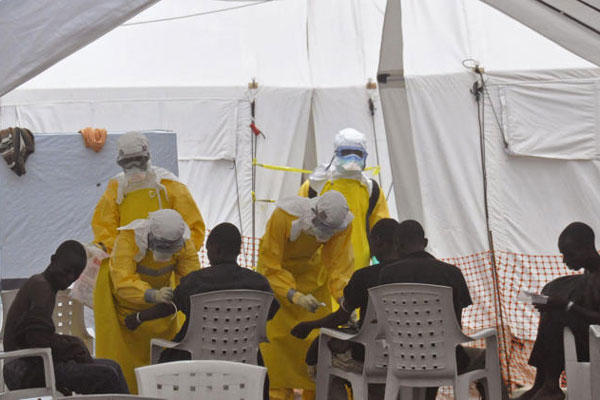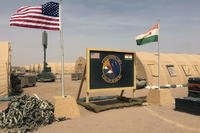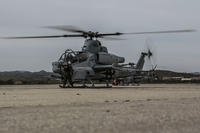Defense Secretary Chuck Hagel has approved spending $22 million to set up a 25-bed field hospital in Liberia to treat healthcare workers affected by the spreading Ebola virus in West Africa, Pentagon officials said Monday.
The Defense Department's effort was requested by the U.S. Agency For International Development (USAID), the lead U.S. agency for battling the epidemic, and the $22 million will come from the Defense Department's Overseas Humanitarian and Civic Aid Fund.
Army Col. Steve Warren, a Pentagon spokesman, said that U.S. personnel would set up the facility in Monrovia, the Liberian capital, hand it over to the Liberians and then leave the country. "No U.S. personnel right now are going to be providing patient care" at the 25-bed field hospital, Warren said.
"The intent of this piece of equipment is to provide a facility that healthcare workers in the affected region can use for themselves if they become ill or injured," Warren said. "We are deploying the hospital facility, setting it up, stockpiling it. We'll turn it over to the government of Liberia and then the DoD personnel will depart."
Pentagon officials said it was not immediately known when the first significant effort by the U.S. military to help combat Ebola would begin, how many U.S. personnel would be involved, or how long it would take to complete the mission.
Laurie Garrett, a senior fellow for global health at the Council on Foreign Relations, said her initial reaction when told that the U.S. military would become involved was "Hallelujah – the cavalry's coming."
However, she called the commitment of $22 million for a small field hospital "deeply disappointing. There is no organization on the planet that can mobilize or handle actual logistics better than the U.S. military."
"No one is better suited for the job" of providing support for combating a fast-spreading disease, Garrett said. "I'm deeply disappointed if this is the sum total of what the military is prepared to do."
The U.S. military effort followed on President Obama's announcement Sunday that the U.S. needed to do more to contain the epidemic that began in Guinea, spread to Liberia and Sierra Leone, and now to Nigeria, before it became a threat to the U.S.
"If we don't make that effort now, and this spreads not just through Africa but other parts of the world, there's the prospect then that the virus mutates, it becomes more easily transmittable," Obama said on NBC's "Meet The Press."
"And then it could be a serious danger to the United States," Obama said, stressing the need to "get U.S. military assets just to set up, for example, isolation units and equipment there, to provide security for public health workers surging from around the world."
Global health officials estimate the number of deaths from Ebola in West Africa at more than 2,100 and have said that the epidemic is most intense in Liberia, where more than 2,000 cases and 1,000 deaths have been reported.
At meetings in Washington last week, officials of the United Nations' World Health Organization (WHO) said the Ebola outbreak could be stopped in six-to-nine months but only with a "massive" international response.
Dr. Margaret Chan, Director-General of the WHO, said the Ebola outbreak is "the largest, most complex and most severe we've ever seen" and is racing ahead of control efforts.
Dr. David Nabarro, UN Coordinator for the Ebola Response, put the cost of combating Ebola at $600 million and said several thousand healthcare workers were needed in the effort.
Keiji Fukuda, the WHO Assistant Director-General for Global Health Security, said "We don't have enough health workers, doctors, nurses, drivers, and contact tracers" to handle the increasing number of cases.
"Most of the infections are happening in the community, and many people are unwilling to identify themselves as ill. And if they do, we don't have enough ambulances to transport them or beds to treat them yet," Fukuda said.
-- Richard Sisk can be reached at richard.sisk@monster.com





























